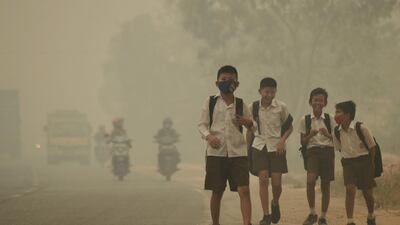JAKARTA // Indonesia, Malaysia and Singapore have dismissed research that smoky haze from catastrophic forest fires in Indonesia last year caused 100,000 deaths.
Some even contend the haze caused no serious health problems, but experts say those assertions contradict well-established science.
Last year’s fires in Sumatra and the Indonesian part of Borneo were the worst since 1997. They burned about 261,000 hectares of forests and peatland and sent haze across the region for weeks. Many were deliberately set by companies to clear land for palm oil and pulpwood plantations.
The study in the journal Environmental Research Letters by Harvard and Columbia researchers estimated the amount of health-threatening fine particles – often referred to as PM2.5 – released by the fires that burned from July to October and tracked their spread across South-east Asia using satellite observations.
A spokesman for Indonesia’s disaster mitigation agency said the research “could be baseless or they have the wrong information”. Indonesia officially counted 24 deaths from the haze including people killed fighting the fires.
Singapore’s health ministry said the study was “not reflective of the actual situation” and that short-term exposure to haze will generally not cause serious health problems. It said the overall death rate did not change last year.
In Malaysia, health minister Subramaniam Sathasivam said officials are still studying the research, which is “computer generated, not based on hard data”.
“People have died but to what extent the haze contributed to it, it’s hard to say,” he said. “If an 80-year-old fellow with high blood pressure, diabetes, heart problem and exposure to haze died, what did he die of?”
The dry season fires are an annual irritant in Indonesia’s relations with its neighbours Singapore and Malaysia. The 2015 burning season, which was worsened by El Nino’s dry conditions, also tainted Indonesia’s reputation globally by releasing a vast amount of atmosphere-warming carbon.
The Indonesian government has stepped up efforts to prosecute companies and individuals who set fires and also strengthened its fire-fighting response. Jamal Hisham Hashim, research fellow with the International Institute for Global Health in Kuala Lumpur, Malaysia, said governments should not dismiss the study even if the estimated deaths are arguable.
He said decades of air pollution research that followed London’s killer smog in 1952 has established the relationship between fine particulate matter and premature deaths, particularly in people with existing respiratory and cardiovascular diseases.
“The pollution level that occurred during the haze is severe enough to cause premature deaths. That is indisputable,” he said. “The study is a wake-up call. We need to be shaken; we have become too complacent with the haze.”
Joel Schwartz, an author of the study who is regarded by his peers as one of the world’s top experts on the health effects of air pollution, said authorities in the affected countries have not offered any details of how they reached conclusions critical of the study.
During the haze, Malaysia suffered air pollution at 10 times the level that the World Health Organisation says causes premature deaths, he said, while Singapore’s claim that short-term exposure does not have serious effects is factually incorrect.
Due to a worldwide trend for declining mortality, Singapore’s assertion that its death rate was unchanged from 2014 did not demonstrate anything, Mr Schwartz said. The study’s premise is that deaths are higher than what they would be without the haze rather than a comparison to a particular year, he said.
* Associated Press

